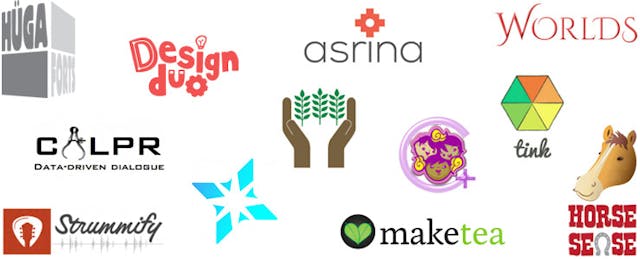Each year, the Stanford School of Education's Learning, Design and Technology students offer a glimpse of the future of education. And the sights and sounds never fail to surprise. At the this year's LDT Expo, they definitely put a new spin on the "technology" part, with projects that include forts, tea ceremonies, and talking horses.
One interesting twist on this year's cohort: none of the twelve projects were specifically designed for the K-12 classroom or tackled "conventional" subjects like math or reading. Two projects tackled computer science and coding logic with fun manipulatives like wooden blocks. Another two tackled healthcare education. And always popular are hands-on projects involving toolkits and boxes that encourage get kids and parents to build things together.
That's not to say that these creative projects can't be adapted for use in schools. But the wide range and diversity of the projects showed just how educational "problems"--and solutions--often transcend beyond formal institutionalized learning.
Here's a list of the projects:
Asrina: "Interactive culturally relevant health education" for Peruvian children and parents
Calpr: "Data-driven dialogue" platform that facilitates communication between doctors and patients to create better healthcare plans
Cuentame Mas: Mobile app designed to foster family interaction for Latino families through storytelling
DesignDuo: A DIY toolkit designed to get dads and daughters to build things together to drive engagement and interest in STEM
Huga Forts: Portable fort-building kit that lets kids create their own imagined playground and communities
Horse Sense Problem Solver: App that helps users think and talk through problems with a horse named Sage
Maketea: iPad app and physical tea kit that brings back a traditional Chinese tea ceremony (gongfu cha) to help couples communicate
Raksha: Educational tool for agricultural communities in rural India
Sparkl: Web platform for synchronous collaboration, ideation and brainstorming (think virtual Post-it notes)
Strummify: Adaptive Guitar Hero...on a real guitar!
Tink: Toolkit and iPad app that encourage kids to manipulate physical environment with sensors and lights. Also featured a side project, Dr. Wagon, where kids can learn basic principles of coding by re-arranging blocks
Worlds: Game designed to help middle-school students learn programming concepts by exploring and manipulating virtual worlds


